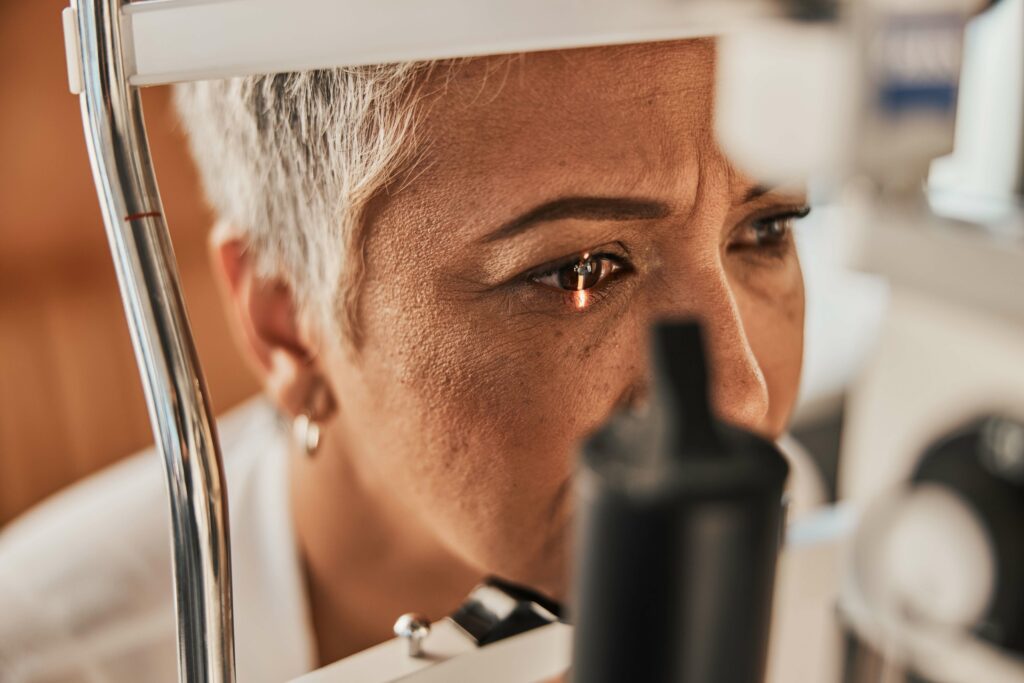Concussions, often referred to as mild traumatic brain injuries (mTBIs), are more common than you might think, especially among athletes. A significant yet often overlooked consequence of a concussion is its impact on vision. Many athletes and concussion patients experience vision problems following an injury, which can be both frustrating and concerning.
So, how long can vision problems last? The amount of time that each person experiences vision issues after a concussion varies greatly. The severity of the concussion, the person’s pre-existing medical issues, and the efficacy of the therapy received are some of the factors that affect recovery time.
Proper Evaluations with an eye doctor who specializes in neuro-rehabilitative concussion management are crucial to monitor vision issues and provide insights into managing them effectively.
Understanding Concussion-Related Vision Problems
The brain is a complex organ where millions of neurons work together to perform a multitude of functions. When a concussion occurs, the trauma disrupts these neural networks, affecting various cognitive and sensory processes, including vision. The impact can damage the brain’s visual processing centers, leading to visual disturbances.
Common Vision Problems After a Concussion
Concussion-related vision problems vary widely and may include:
- Blurred vision: Difficulty in seeing objects clearly.
- Double vision: Seeing 2 images of a single object.
- Light sensitivity: Discomfort or pain from bright lights.
- Difficulty focusing: Trouble concentrating on objects or reading.
- Eye strain: Fatigue after short periods of visual activity.
- Visual field loss: Not being able to see to the sides without turning your head.
How Long Do These Issues Typically Last?
The duration of vision problems following a concussion varies significantly from person to person. Several factors influence recovery time, from the severity of the concussion to the effectiveness of the treatment received.
Short-Term Effects
For many individuals, vision problems may resolve within a few days to weeks. Studies indicate that approximately 80% of patients show significant improvements in their vision symptoms within 2 weeks post-concussion. This rapid recovery can often be attributed to the brain’s natural healing process.
Long-Term Effects
However, for others, especially those with severe concussions or repeated injuries, vision problems can persist for several months or years. In some cases, patients might experience chronic issues requiring long-term management and rehabilitation.

Factors Affecting Recovery Time
Severity of the Concussion
The more severe the concussion, the longer it may take for vision problems to subside. Severe concussions often result in more extensive brain damage, which can prolong recovery.
Pre-existing Conditions
Individuals with pre-existing vision conditions or neurological disorders may experience more prolonged vision problems following a concussion.
Age & General Health
Younger individuals and those in good general health tend to recover more quickly from concussions compared to older adults or those with underlying health issues.
Repeated Concussions
Athletes who have suffered multiple concussions are at risk of experiencing more severe and longer-lasting vision problems. Repeated brain injuries can lead to cumulative damage, making recovery more challenging.
Managing Vision Problems Post-Concussion
While the timeline for recovery varies, there are steps patients can take to manage their vision problems effectively.
Seek Professional Help
Visiting a healthcare professional specializing in concussions and vision therapy is crucial. They can conduct a thorough assessment and create a personalized treatment plan to address specific vision issues.
Vision Therapy
Vision therapy involves a series of exercises designed to improve visual skills and processing. It can be particularly effective for problems like difficulty focusing and eye coordination issues.
Rest & Gradual Return to Activity
Rest is essential for recovery. Allow your brain time to heal by taking breaks from activities that strain your eyes, such as reading or using digital devices. Gradually reintroduce these activities as your symptoms improve.
Manage Light Sensitivity
To cope with light sensitivity, wear sunglasses or hats outdoors, and reduce screen brightness indoors. Specialized glasses or contact lenses may also help.
Stay Hydrated & Maintain a Healthy Diet
Proper hydration and a balanced diet support overall brain health and recovery. Foods rich in omega-3 fatty acids, antioxidants, and vitamins can promote healing.
Monitor Symptoms
Keep track of your symptoms and their progression. This information can assist healthcare providers in adjusting your treatment plan as needed.
When to Get a Professional’s Advice
Vision problems after a concussion can be a source of distress for athletes and patients alike. While most individuals experience significant improvements within a few weeks, some may encounter long-lasting issues requiring ongoing management. By understanding the factors influencing recovery and adopting appropriate strategies, individuals can enhance their chances of a full recovery. Recovery is fastest when therapy is begun as soon as possible following the concussion.
If you or someone you know is struggling with vision problems after a concussion, reaching out to a healthcare professional specializing in concussion management is crucial. For more information, book an appointment with Milton Vision & Sport Vision. We can provide guidance, support, and tailored treatment plans to aid in the recovery process.
Remember, patience and persistence are key. With the right approach, you can regain clarity and focus, allowing you to return to the activities you love.



